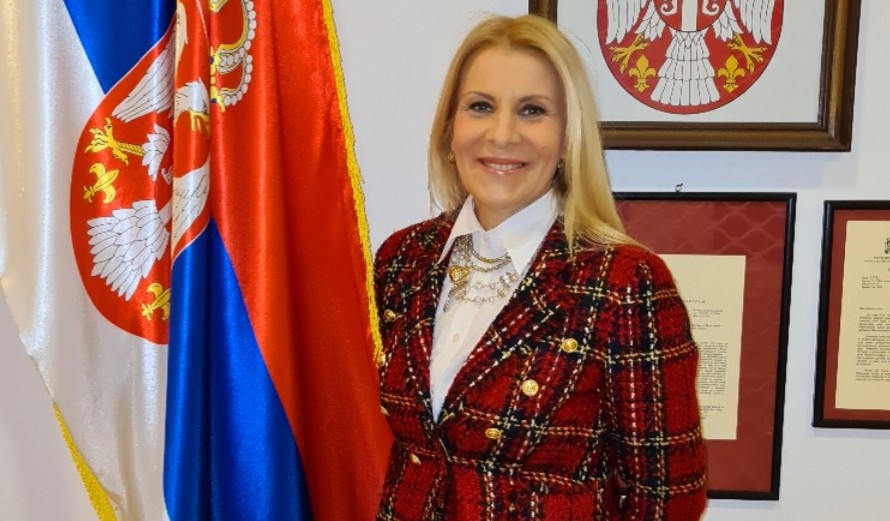The turning point was 2018 was when the value of the trade between the two countries exceeded 1 billion euro
Vienna is an important political and business centre, as well as the place of residence for many Serbian citizens so, in that sense, is also a space for improving cooperation with the help of the representatives of the Serbian economy. The role of the representative office of the Chamber of Commerce and Industry of Serbia (CCIS) in Vienna is to facilitate and improve the economic activities and operations of Serbian companies in Austria. The representative office works on boosting political and economic cooperation, providing direct support to Serbian businesses and disseminating information that is important for Serbian companies. We talked with the director of the CCIS representative office in Vienna, Nada Knežević, about the Office’s activities, results and plans.

How does the representation of the Chamber of Commerce and Industry of Serbia in Vienna contribute to the development of the Serbian economy?
The representative office of the Chamber of Commerce and Industry of Serbia in Vienna was established in 2005 to provide additional support to Serbian companies that are interested in establishing business cooperation with Austrian companies. Serbian companies are usually interested in possibilities and ways of marketing their own products, looking for partners to establish cooperation or joint business presence in the Austrian or other markets, as well as searching for investors to expand their own business capacities in Serbia. In recent years, Serbian companies have been particularly interested in opening their own representative offices or companies in Austria with the primary goal of increasing their business activities in this market, but also to expand their business to other EU countries, primarily those of the German-speaking area in the EU. Almost all Serbian companies that have been successful in Austria, as a result, have been developing in Serbia in terms of increasing their capacity and number of workers, modernizing production and production equipment, but also in terms of final product quality and appearance, especially in design. The Austrian market is financially strong but at the same time, very demanding, so the competition is quite stiff.
The Austrian market is financially strong but at the same time, very demanding, so the competition is quite stiff.
On the other hand, we should also note that many business people in Austria are of Serbian origin and own very successful and renowned companies. A large number of these companies have gained a comparative advantage in the Austrian market based on cooperation with Serbian companies, or hiring a Serbian workforce. The cooperation is also based on the interest of Austrian companies in doing business on the Serbian market, regardless of whether it is an opportunity to invest, place products or look for partners for some other type of cooperation. When we take all of this into account, it is clear to see that there is a lot of work to be done. Every successfully implemented project or cooperation is a reason for satisfaction, but when you are involved in helping a Serbian company launch its business in Austria when it achieves success over time, starts to grow, employs Austrian workers and becomes a recognized brand in the community in which it operates, you really do feel special.
Could you tell us about the overall trade between Serbia and Austria?
Trade between the two countries has been constantly growing, and although, over a few years, that growth was modest, the year 2018 marked a turning point when the trade value exceeded 1 billion euro for the first time. After that, the growth was quite rapid, so in 2019, the value of the trade was a little over 1.25 billion. According to all forecasts, as well as the realized indicators in the first quarter of 2020, it was almost certain that the value of the 2020 trade would exceed 1.45 billion euro. Unfortunately, the coronavirus epidemic happened and this projected value was not achieved solely for this reason. It is difficult to predict when the situation will return to normal, but it is encouraging to see that despite the incredible difficulties that accompanied and hindered business between the two countries, the high trade level was sustained last year.
To what extent did the pandemic affect the trade between Serbia and Austria in 2020, but also the activities of the CCIS representative office in Vienna?
Since late February 2020, when the first case of coronavirus infection was registered in Austria and the first extremely restrictive measures were introduced in mid-March, business and trade are also experiencing an emergency. Even though during the past year there were short periods in Austria when restrictions on movement and work were eased, the situation is far from normal this year as well. The very beginning of the pandemic was marked by restrictions on movement and a major problem in terms of the road transport of goods.
The biggest trade takes place in the metal-processing industry and the production of machines and devices, as well as vehicle assemblies.
We all remember the restrictions on the movement of workers, the abolition of business travel opportunities, the introduction of special notice regimes and trips taken because of urgent business obligations. Although the problems have varied over time, all economic actors in both countries have made a great effort to eliminate the problems and barriers as soon as possible and establish certain normalcy in business. The representative office faced many challenges. We monitored regulations and laws that were passed, especially in the first months after the outbreak of the pandemic, almost 24 hours a day, so we had to update the reports on the changes at least twice a day. The changed business regimes also included new procedures, obtaining various approvals and additional formalities. Despite all the additional work caused by the new situation, the representative office still performs all other regular activities in terms of support to Serbian companies, aside from assistance with participation in trade fairs, which have been mostly cancelled or postponed in Austria. Although a transitional solution has been found in the meantime, and there are currently a large number of events that are being held virtually, the interest shown by the business community has been incomparably weaker.

In which economic sectors is the trade the most developed, and which have the potential for a bigger trade?
The biggest trade takes place in the metal-processing industry and the production of machines and devices, as well as vehicle assemblies. Serbia mostly exports to Austria coiled sheets and strips, washing and cleaning detergents, chandeliers, jewellery and similar glass-made products, sets of ignition wires, and various sets for motor vehicles. We can say with a high degree of certainty that, in the following period, these products will have a large share in Serbian exports. There is great potential in exporting agricultural and food products, as well as in the services sector. In terms of services, it is interesting to note that we are mainly talking about IT services, as well as designing factories and various other facilities. Although Serbia has been exporting substantial quantities of raw materials and semi-finished products to Austria in recent years, this is gradually changing, namely, Serbia has recorded an increase in exports of highly processed goods. This is, among other things, the reason why in recent years there has been a significant decline in the trade deficit, which, unfortunately, has always been on the Serbian side.
The Austrian government has been considering changing the country’s industrial policy. How can this affect cooperation with Serbia?
Regarding these changes, the greatest chance lies in the considerations related to returning certain production capacities to Austria or neighbouring countries, which are currently located in faraway destinations. If such plans are implemented, there is a great chance that one, perhaps larger, part of such capacities will be allocated to Serbia. Although Serbia is not a neighbouring country to Austria, it is often viewed as such due to its proximity. This proximity, which affects both the speed of deliveries and low transport costs, along with other business advantages and conveniences, which sets Serbia apart from other countries in the region, can be a decisive factor for Serbia to attract such production plants, which would ensure the influx of new Austrian investments.
Austria is a developed country. What can we learn from the Austrians about improving our economy?
Although the Serbian economy is progressing and growing, there is still a lot of room for improvement, whether it is improving production, products, business culture, presentation and marketing or better organizing the work of our institutions and better defining legal frameworks. Communication, direct contact, exchange of experiences through cooperation, trade fairs and conferences are necessary prerequisites for knowledge transfer in every respect and both directions. In that sense, it would be very important for all business factors in both countries to jointly work more to overcome the pandemic and create conditions for rapid recovery and further economic growth.